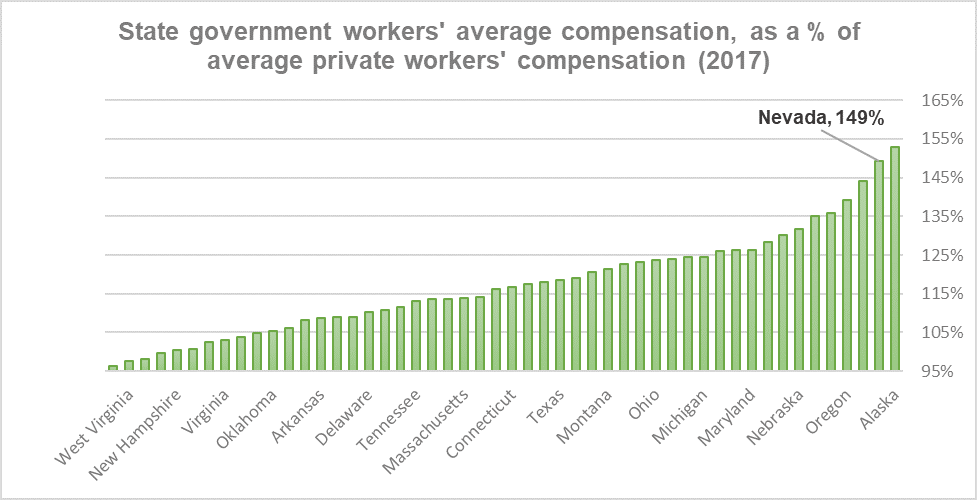Collective bargaining for state workers is about politics, not fairness
Granting collective bargaining powers to Nevada state workers will increase annual spending by an estimated $500 million annually, a cost that will be passed onto taxpayers through higher taxes, reduced services or both.
The arguments most commonly used in support of Senate Bill 135, which is scheduled for a hearing before the Senate Government Affairs Committee next Wednesday, is the false belief that state workers are underpaid.
But a new study from Nevada Policy, The Political Push for State-Worker Collective Bargaining, shows that compensation for Nevada state workers already ranks among the highest nationwide, and dwarfs the amount earned by the average taxpayer.
Specifically, the report found that average compensation for Nevada state workers ranks 10th highest nationwide on a raw, unadjusted basis, and fifth highest when accounting for the different price levels among the 50 states.
At 49 percent greater than the average private-sector worker, compensation for Nevada state workers ranked second highest nationwide:
Perhaps most revealing is the expressed preferences of Nevada state workers themselves, who have a voluntarily quit rate of roughly one-third the level found in the private sector nationwide.
So why do so many lawmakers support a policy that will require raising taxes on those earning less to enrich those making more?
Politicians embrace the unionization of government workers for political reasons, according to NPRI Policy Director Robert Fellner.
“Politicians are happy to promise above-market compensation to government unions, as they do so with other people’s money. Moreover, politicians are keenly aware of the outsized role these organizations play in the election process, essentially operating as tax-funded political action committees.”
This “corrosion of the democratic process” comes at a heavy price for ordinary Nevadans, Fellner said.
“Raising taxes on private-sector Nevadans, who on average earn much less themselves, to further inflate the pay premium enjoyed by Nevada’s government workers is neither fair nor sustainable,” Fellner said.
At the very least, the public deserves to have accurate information about the laws that are ostensibly being passed on their behalf, Fellner says.
“Lawmakers should not be enacting policies based on misinformation. Those arguing for collective bargaining for state workers, and the additional $500 million in annual spending that comes with it, have repeatedly espoused falsehoods regarding state worker compensation.
“The data is clear and overwhelming: Nevada state workers receive compensation that ranks among the richest nationwide, regardless of the metric used.”
To read the full study, please click here.
